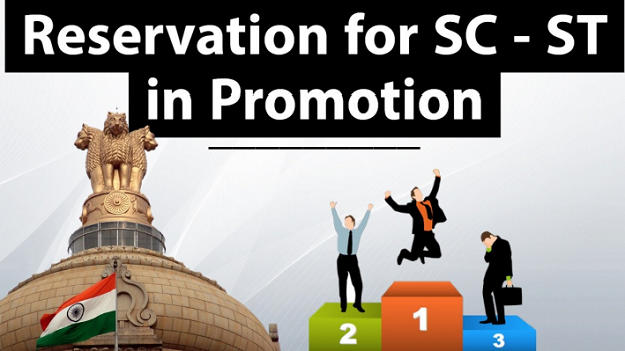Table of Contents

SC said that the Government can go ahead with promotions in government offices “in accordance with law”. What law was the SC referring to?? On the issue of quota in promotion in government jobs , the apex court’s 2006 judgement in M. Nagaraj & Others vs. Union of India & Others would be applicable
Article 16 – Equality of opportunity in matters of public employment
1. There shall be equality of opportunity for all citizens in matters relating to employment or appointment to any office under the State.
2. No citizen shall, on grounds only of religion, race, caste, sex, descent, place of birth, residence or any of them, be ineligible for, or discriminated against in respect of, any employment or office under the State.
3. Nothing in this article shall prevent Parliament from making any law prescribing, in regard to a class or classes of employment or appointment to an office under the Government of, or any local or other authority within, a State or Union territory, any requirement as to residence within that State or Union territory prior to such employment or appointment.
4. Nothing in this article shall prevent the State from making any provision for the reservation
• Indira Sawhney case in 1992 – SC permitted reservation for the SCs and STs in promotion to continue only for a period of five years
• Govt brought the 77th CAA in 1995 to continue the reservation in promotions further.
• Article 16(4A) is a special provision which provides for reservation for promotion only to SCs and STs. • 81st amendment – to permit the government to treat the backlog of reserved vacancies as a separate and distinct group, to which the ceiling of 50 per cent did not apply.
• 82nd amendment – inserted a provision in Article 335 to enable states to give concessions to SC/ST candidates in promotion.
• 85th amendment – to give the benefit of consequential seniority to SC/ST candidates promoted by reservation. The validity of all the above four amendments was challenged in the Supreme Court through various petitions clubbed together in M. Nagaraj & Others vs. Union of India & Others, mainly on the ground that these altered the Basic Structure of the Constitution. In 2006, the Supreme Court upheld the amendments.
But the Court stipulated that the concerned state will have to show, in each case, the existence of “compelling reasons” – which include “backwardness”, “inadequacy of representation” and overall “administrative efficiency’’ – before making provisions for reservation.
• The court further held that these provisions are merely enabling provisions.
• If a state government wishes to make provisions for reservation to SC/STs in promotion, the state has to collect quantifiable data showing backwardness of the class and inadequacy of representation of that class.
• A number of High Courts, following Nagaraj, have struck down reservation in promotions after applying these requirements.
2011 Census
• Dalits (SCs) account for 16.6 % of India’s population.
• Tribal people (STs) account for 8.6 %
According to the findings of the Socio Economic and Caste Census 2011

Central Government jobs ~ 30 lakh
Category Reservation mandated Posts actually filled as of 2015 acc to DoPT SC 15 17.6 ST 7.5 7.7 OBC 27 17.7 Total 49.5% 43%
• While entry is ensured for Dalit and tribal bureaucrats in the system through reservation, they continue to face discrimination within the system, which remains dominated by upper castes at the decision-making level
• The SCs, STs and OBCs have their highest representation among safai karmacharis and Group-C employees.
• General category employees have the highest representation Among Group-A – 69.3 % Group-B – 67.4 %

Representation in top level Bureaucracy as of January 2018 – acc to RTI
There are 81 secretary rank officers in the central government (senior most IAS officers) 2 – from scheduled castes 3 – from scheduled tribes Joint secretary and above SC+ ST = 9 % OBC = 3%
Burning Issues | Free PDF
By Dr. Mahipal Singh Rathore
Facebook Id-> facebook.com/mahipalsinghrathore
























 WhatsApp
WhatsApp